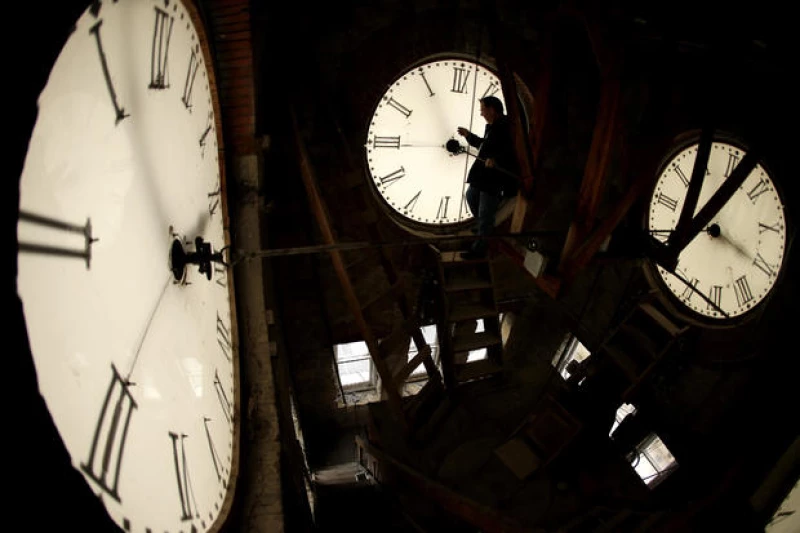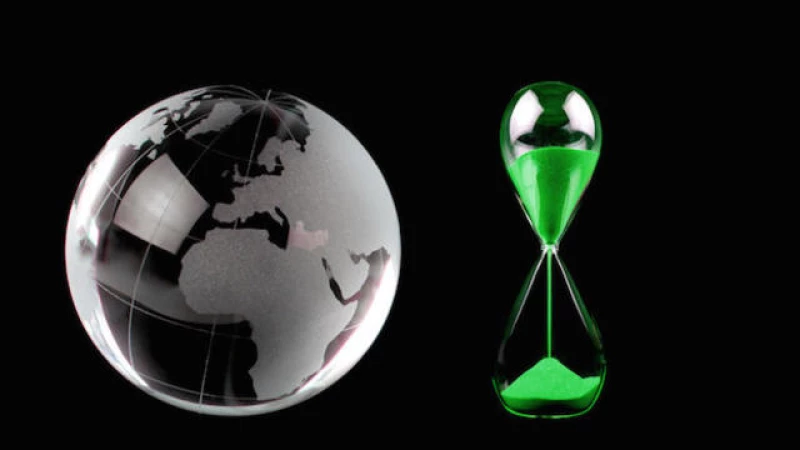Earth's changing spin is threatening to toy with our sense of time, clocks and computerized society in an unprecedented way — but only for a second.
For the first time in history, world timekeepers may have to consider subtracting a second from our clocks in a few years because the planet is rotating a tad faster than it used to. Clocks may have to skip a second — called a "negative leap second" — around 2029, a study in the journal Nature said Wednesday.
"This is an unprecedented situation and a big deal," said study lead author Duncan Agnew, a geophysicist at the Scripps Institution of Oceanography at the University of California, San Diego. "It's not a huge change in the Earth's rotation that's going to lead to some catastrophe or anything, but it is something notable. It's yet another indication that we're in a very unusual time."
Ice melting at both of Earth's poles has been counteracting the planet's burst of speed and is likely to have delayed this global second of reckoning by about three years, Agnew said.
"We are headed toward a negative leap second," said Dennis McCarthy, retired director of time for the U.S. Naval Observatory who wasn't part of the study. "It's a matter of when."
It's a complicated situation that involves, physics, global power politics, climate change, technology and two types of time.
Earth takes about 24 hours to rotate, but the key word is about.
For thousands of years, the Earth has been generally slowing down, with the rate varying from time to time, said Agnew and Judah Levine, a physicist for the time and frequency division of the National Institute of Standards and Technology.
The slowing is mostly caused by the effect of tides, which are caused by the pull of the moon, McCarthy said.
This didn't matter until atomic clocks were adopted as the official time standard more than 55 years ago. Those didn't slow.
That established two versions of time — astronomical and atomic — and they didn't match. Astronomical time fell behind atomic time by 2.5 milliseconds every day. That meant the atomic clock would say it's midnight and to Earth it was midnight a fraction of a second later, Agnew said.
Throughout the years, fractions of seconds were accumulated to form whole seconds, leading to the addition of a "leap second" in June or December to align astronomical time with Coordinated Universal Time (UTC) starting in 1972. This adjustment meant that instead of the clock striking midnight at 11:59 and 59 seconds, there would be an extra second at 11:59 and 60 seconds. Conversely, a negative leap second would transition directly from 11:59 and 58 seconds to midnight, skipping 11:59:59.
Between 1972 and 2016, a total of 27 leap seconds were added as Earth's rotation slowed down. However, the rate of deceleration was diminishing.
"Around 2016 or 2017, or possibly 2018, the slowdown rate had decreased to the point where Earth was actually speeding up," explained Levine.
This acceleration is attributed to Earth's hot liquid core, described as "a large ball of molten fluid," which behaves unpredictably due to various eddies and flows, according to Agnew.
Agnew pointed out that the core has been contributing to the acceleration for approximately five decades, but the rapid ice melt at the poles since 1990 obscured this effect. The redistribution of Earth's mass from the poles to the bulging center due to melting ice slows down the planet's rotation, akin to a spinning ice skater slowing down by extending their arms outward, he elaborated.
If not for the ice melt effect, Earth would require a negative leap second in 2026 instead of 2029, as per Agnew's calculations.
For years, astronomers managed to synchronize universal and astronomical time using leap seconds. However, operators of computer systems raised concerns about the challenges posed by these additions for the precise technology that the world heavily depends on today. In 2012, certain computer systems mishandled the leap second, causing disruptions for platforms like Reddit, Linux, and Qantas Airlines, experts revealed.
"Why is this adjustment necessary when it causes so many issues?" questioned McCarthy.
On the other hand, Russia's satellite system depends on astronomical time, so getting rid of leap seconds would create problems for them, as noted by Agnew and McCarthy. Astronomers and others preferred to maintain the system that would insert a leap second whenever the gap between atomic and astronomical time approached a second.
In 2022, global timekeepers agreed that starting in the 2030s, they would revise the criteria for adding or removing a leap second, reducing the likelihood significantly.

According to Levine, tech giants like Google and Amazon independently implemented their own solutions to the leap second problem by gradually incorporating fractions of a second over a complete day.
"The disputes are so intense because the rewards are so minimal," Levine remarked.
Additionally, Agnew pointed out the "peculiar" consequence of subtracting, rather than adding a leap second. Skipping a second is expected to be more challenging because software programs are programmed to add, not subtract time, as mentioned by McCarthy.
McCarthy acknowledged that the trend towards requiring a negative leap second is evident, but he believes it is more related to the Earth becoming more spherical due to geological shifts since the end of the last ice age.
Three other independent scientists supported Agnew's research, deeming his evidence convincing.
However, Levine is skeptical about the necessity of a negative leap second. He believes that while the overall slowing trend due to tides has been ongoing for centuries, the shorter trends in Earth's core are more unpredictable.
"This is not a process where the past can accurately predict the future," Levine commented. "Making long-term predictions about the future is extremely uncertain."







